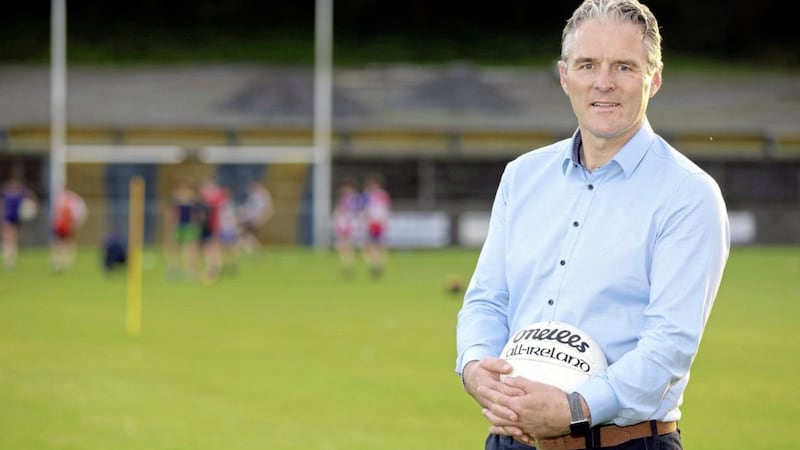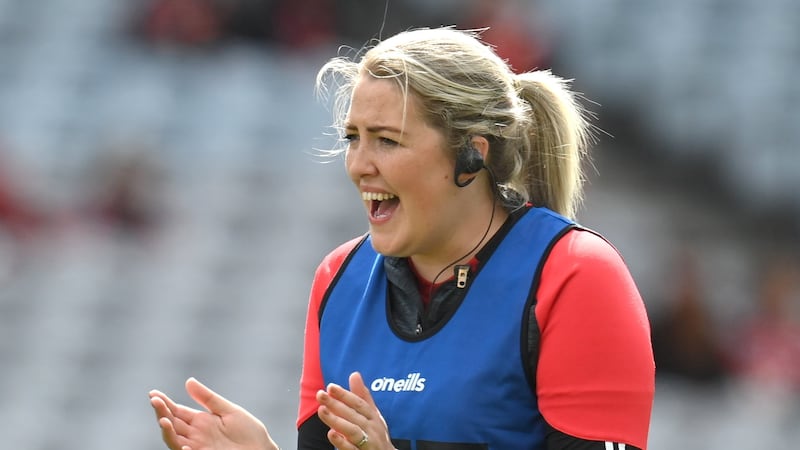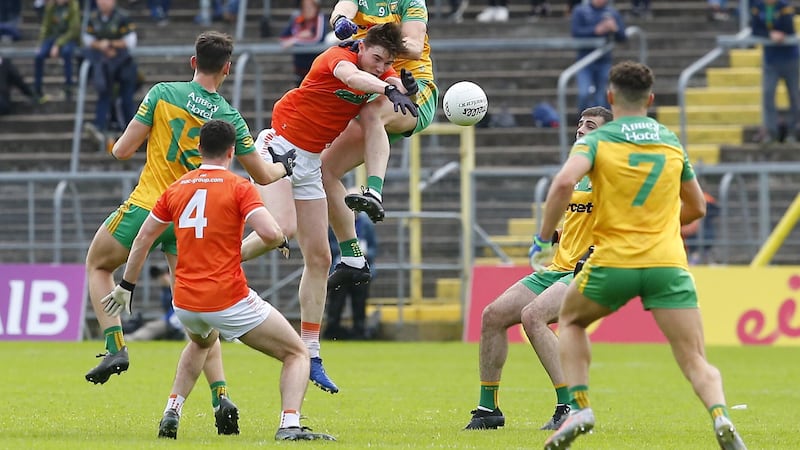Cahair O’Kane: Why go for the presidency now?
Jarlath Burns: “I made my decision shortly after John Horan was appointed. I felt it was a good time in my life. I’ve built up a lot of experience in the GAA. I’m in my 50s but I still have a lot of energy, and I can give a lot to the association as president. If I was to wait another few years, I’d be coming up against Ciaran McLaughlin, which I wouldn’t want to do, I’d want to support Ciaran. I think in order to become a president, you have to have that knowledge of how it works at the top, but be absolutely rooted in the normal, everyday fundamentals of what makes the club tick. We’d a meeting last night that went on to 11.30. Although people might see me as being a Croke Park person, it’s in Silverbridge that my heart and soul lies.”
CO’K: Has the GAA’s path and direction become detrimental to the club?
JB: “I hear that being said a lot. The more you hear it, the more you feel that it’s either A) true, or B) it’s not true and the GAA isn’t getting its message out properly. I think it’s a mixture of both. It’s almost said as a cliché that 83% of the GAA’s income goes straight back out to the counties and clubs. Our values are very important but there’s a fine line between staying true to those and trying to maximise the revenue potential to grow the association. I remember when the vote came up whether the GAA should take the incredibly lucrative money that could come from betting companies. That’s out. Alcohol companies sponsoring jerseys, that’s out. For every other sport, that would finish it. The GAA, because of its strong community values, eschew that sort of sponsorship. I think more than anything we’re not getting our message out as to exactly what we’re about.”
CO’K: Most of the income generated by the GAA centrally and its county boards is ploughed straight into running county teams. Is the amateur status sustainable in that light?
JB: “The county game brings in the biggest revenue. There was a massive consultation done when the GAA rebranded and the number one thing that was said at that time was that the GAA was not maximising its revenue potential. Peter McKenna was put in to do that and he’s done an incredible job. Now people are saying we’ve gone the other road and forgotten our values, but I don’t agree. “Dublin has been a remarkable success but because our games are built around competition, if you invest somewhere too well, you give an unfair advantage. If the GAA had been in charge of, say, promoting the Irish language and had that success, it would have been wonderful.
“I agree that the county team scenario is a juggernaut, and one that we’re just about in control of. There’s a cottage industry of backroom staff that’s become a hidden economy. I know county chairmen have been meeting with John Horan and they’re trying to standardise payments to all those people. That’s a big challenge.”
CO’K: Can you reign it in?
JB: “The answer is no. The GAA has tried to reign it in. They introduced a closed season – counties ignored it. The GAA has not ramped it up. The prizes for winning the All-Ireland are still the same – two cups. It’s been ramped up by counties who want excellence. That’s not a bad thing. But the amateur status exists because the game should be accessible to all who want to play it. You don’t have to give up your job. The way the game has gone, I could think of 10 players who could play for Armagh, but who can’t because they’re working in Dublin or they’re tradesmen or they’re farmers, and their time doesn’t allow them. Logically, you’d say just make counties train Tuesday and Thursday night, but they would disobey that. In order to pull it back, it would require a massive cultural shift, and the GAA doesn’t like to regress.”
__________________________________
Jarlath Burns factfile
- Former Ulster winning Armagh captain, represented the county for 13 years
- Silverbridge club chairman (2012-2015); secretary (2015-present)
- Ulster Council management committee member; UC Armagh delegate
- Armagh management committee member
- Former chairman of Standing Committee on Playing Rules
- Former Central Council member (2000-2003)
- Former players’ representative to Central Council
- GAA management committee member (2012-2013)
- GAA strategic committee member (2000)
__________________________________
CO’K: Does that not all mean we’re on a path that we can’t be taken back from, towards professionalism?
JB: “No, I don’t think we are. The amateur status is our number one value, and every single good part of the GAA flows from that. The amateur status is a delicate dynamic and it’s the only place in the world it exists. Change any part of that and it changes the entire ethos of the association. Professional rugby was imposed on Ireland by the global game, and it’s produced four teams and a national team. If they did a strategic review of their own association and worked out how professionalism has impacted on their game, you’ll find an awful lot of it is negative.”
CO’K: Are we not at that point in all but name? For instance, players in the top counties rarely, if ever, play for their clubs?
JB:“That’s an individual decision that some people make, even in our county. I’d argue those players aren’t getting the full-blooded benefit of being a GAA person, who gets the biggest thrill out of playing for their club. The difficulty is like paid managers – if someone is wealthy and wants to see you playing well, they’ll say ‘I’ll pay you a wage and you won’t have to work’. That’s not pay for play, that’s not professionalism. There’s nothing you can do about it. But the GAA is still honouring the amateur status with great integrity.”
CO’K: GPA CEO Paul Flynn has said recently they’ll be coming for a slice of the gate receipts. Their actions appear to be taking things in the direction of professionalism? Is the GPA uncontrollable?
JB: “I’m not bent on the narrative ‘GPA bad, GAA good’. I’m very impressed by a lot of the wellbeing, career, professional courses they run. That’s coming from someone who was pitted against the GPA for five years. At the last two Congresses, I’ve spoken very strongly against GPA motions. In some respects, they can be mischievous in how they promote their message. They need to do a massive PR exercise on what they do because relations between the GPA and the ordinary club member are at rock bottom. Everybody thinks the GPA is a by-word for taking money off the GAA and spending it unwisely. That’s up to them to change that perception. It’s not just the GPA taking this money and paying out big wages to its staff.”
CO’K: Some GAA players are earning the same in expenses as semi-professional soccer players in Ireland. That makes them, by definition, semi-professional?
JB: “I’ve a county player in my house. The nutrition allowance is £28 a week. He can’t have a part-time job because of his commitments. He takes his mother’s car to training, she’s had to insure him on the car and we put the diesel into it, he gets his travelling expenses and he lives on that. He hasn’t a ha’penny in his pocket. There’s a narrative there that the county player’s doing well. There might be a few players who can live off sponsors, and good luck to them. As long as the GAA doesn’t use its money to pay players full-time, it still has a very strong amateur status.”
CO’K: Not personalising it because Jarlath Óg is the same as hundreds of others, but is that not part of the problem? People are forsaking careers, quitting jobs, becoming teachers just so they can have the time. That’s the direction the GPA and the county game are going?
JB: “We are at a stage where we have to seriously question this juggernaut. It’s something county boards worry about. The millennial generation are very keen on training. Most young people are in gyms. GAA players get all that beautiful physique for free of charge. Because we’re an amateur game, you can opt in and opt out. It’s a major test. If you play in the first round of the championship, whether you play well or badly, you’ve made massive sacrifices to get there.”
CO’K: The renewal of the Sky deal will come up during your prospective tenure. Are you in favour of renewing it?
JB: “Last year, 14 games were on Sky. TG4 usually put out three games every weekend, maybe 250 games. I can’t think of any sporting organisation anywhere in the world that offers as much free-to-air as the GAA does. RTÉ were offered the whole rights but cannot afford them. They’ve been a wee bit mischievous in how they’ve responded and their pundits decrying that there’s a paid platform. Our games are a product, and we cannot afford to sell that product cheaply. We should be thanking our lucky stars Sky came in, because we might be getting half of what they’re worth because that would be RTÉ bidding on their own. RTÉ are a good partner and work well with the GAA, but it’s a fine balance of trying to maximise revenue potential while maintaining the link with the grassroots.”
CO’K: Where’s the justification for a deal that puts Mayo-Donegal behind a paywall? Because Páraic Duffy said at the time of the original deal that it wasn’t a financial decision.
JB: “When you’re negotiating the broadcasting rights, there always has to be a financial decision. RTÉ got spooked by the presence of Sky and bid more. The GAA should be concerned that when you show something on Sky, it doesn’t get the same audience as on RTÉ. But even without having a Sky subscription, people have been able to watch them. If I went to that match, I’d have been paying €28 to get in. I could have sat at home and bought it for maybe €5 on GAA Go, or got a weekend pass for Sky. When we [Silverbridge] played Granemore at home in the Armagh SFC, Armagh TV put it on and charged £5. What’s wrong with charging people to see it if they don’t want to go and watch a game themselves? The person who turns up to watch the game in the terrace pays. Ideally, our games would be free-to-air. We need to stop obsessing about 14 games during the year that RTÉ made clear they couldn’t show anyway.”
CO’K: Having Sky in the market leads to the partitioning of the broadcasting rights. If you’re accepting Sky staying in the market, you’re accepting that partition?
JB: “There’s nobody accepting anything before you walk into negotiations. Ideally I’d like to see all our games free-to-air. Ideally it would be great if there was no partition, we had one broadcaster and all our games were free-to-air but also that the GAA got its proper broadcasting price that fitted the quality of our games and the number of people who want to see them.”
CO’K: You’ve said recently that you feel the GAA would have to take a side of Irish unity in the event of a border poll. Was it part of your decision in terms it being a political reality that could become a major issue during your tenure?
JB: “There have only ever been five presidents from the six counties. The GAA has always prided itself on a being a solidly 32-county organisation. At various times, causing discomfort. You have a 32-county mindset but you’re dealing with the reality of two different currencies, different mindsets, different jurisdictions, different laws, different age bands for school. It would send out a strong message at this time, when partition could become hard again, that the most important 32-county organisation in Ireland has a president from the six counties. The GAA has never accepted partition, and nor should we ever. I was making a simple point – in the independence referendum in Scotland, Celtic and Rangers took a position. Barcelona has a very strong position on Catalonia and wanting a separate state. It’s not unreasonable, if there was a border poll, for the GAA to say ‘we want Irish unity’. Apart from our history and emotional attachment to the 32-county ideal, practically, rationally, logically, it makes sense that we’d want our country to be reunited, because it makes it so much easier for us to govern ourselves.”
CO’K: Does the GAA taking a strong side in a border poll not fracture attempts to be more inclusive to unionism?
JB: “I’m part of those cross-community efforts. This school [St Paul’s, Bessbrook] is a beacon for shared education. Next week I’m going to Schomberg House, the Orange Order’s headquarters. Sometimes people think the desire to reunite our country is a subversive one, or not a valid one. It’s a perfectly legitimate desire to have, to see the end of partition. Our language, our flag, our anthem, they are very important to us, but the GAA could teach a lot of organisations how to use those symbols properly and responsibly. It shouldn’t be shock therapy for any unionist to hear that the GAA, which has promoted an Irish identity for its entire existence, wants a united Ireland.”
CO’K: You said in 2015 you’d consider the possibility of dropping the flag and anthem if the idea ever became a live debate. If it came to it, do you feel the same?
JB: “A Jarlath Burns presidency would never have any motion to Congress to change the important position of the flag and the anthem. What I said was totally misrepresented. It’s been said subsequently by Mary-Lou McDonald, that in the context of a united Ireland, if everything was up for grabs and we were reimagining what a 32-county Ireland would look like, that the GAA would play its part in that. We know in the north that flags and anthems can be divisive, but not the way the GAA uses them. It’s not done in a threatening way, it’s just part of the Irish identity of which we’re very proud. There’s no time I feel more in touch with who I am as an Irish person than when I stand and face the flag for my anthem. It was the same when I played for Armagh, it was always a very special moment to stand for the anthem of my country. What I said was totally taken out of context.”








